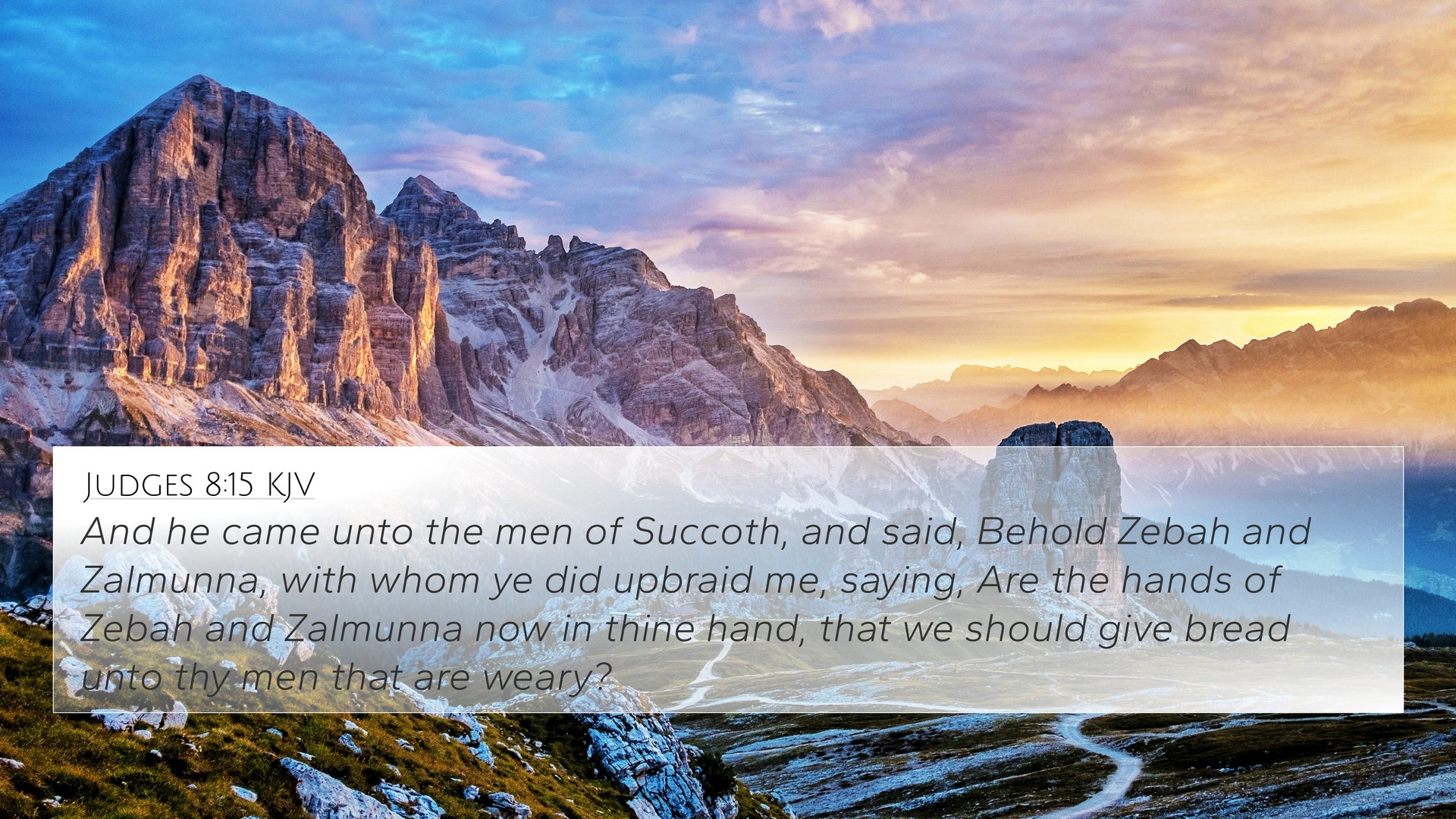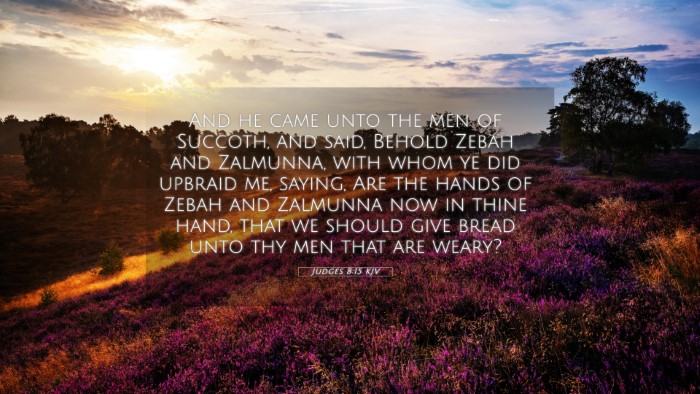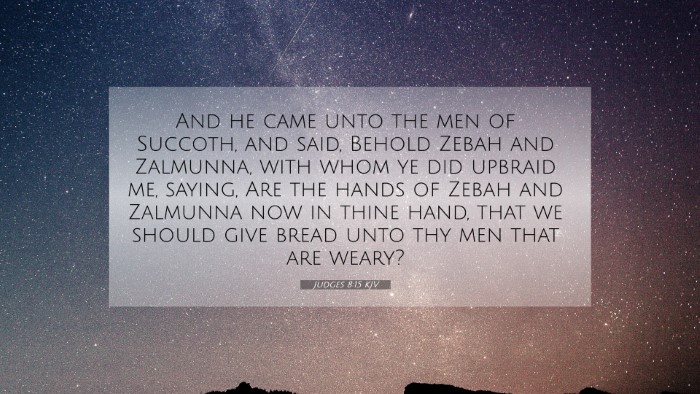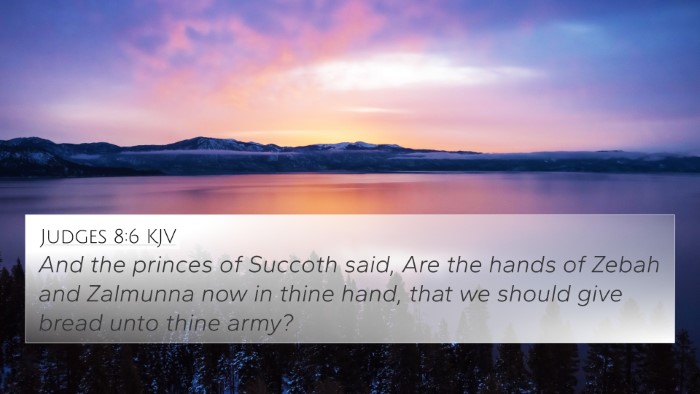Understanding Judges 8:15
This verse reads: “And he came unto the men of Succoth, and said, Behold, Zebah and Zalmunna, with whom ye did upbraid me, saying, Are the hands of Zebah and Zalmunna now in thine hand, that we should give bread unto thy men that are weary?” (Judges 8:15, KJV). This passage reflects a pivotal moment in the context of Gideon’s pursuit of the Midianite kings, Zebah and Zalmunna, and illustrates themes of faith, assistance during trials, and communal responsibilities.
Verse Context
In this chapter, Gideon has just won a significant battle against the Midianites but requires support for himself and his weary army. His request for aid from the men of Succoth is met with scorn and doubt, encapsulated in their disbelief of Gideon’s ability to secure victory over the Midianite leaders. The overarching narrative in Judges speaks to the struggles Israel faced in relying on God amidst external threats.
Commentary Insights
Matthew Henry’s Commentary
Matthew Henry notes that Gideon’s inquiry reflects a challenge to the faith of the men of Succoth. Their lack of support contrasts with the expectation that, as Israelites, they should aid a fellow Hebrew fighting against a common adversary. Henry emphasizes the moral obligation of supporting leaders in righteous battles and highlights the issue of providing necessary help during crises.
Albert Barnes’ Commentary
Albert Barnes provides a historical perspective, explaining that Succoth’s response stems from fear and uncertainty regarding Gideon’s prospects for victory. He comments on the psychological and social dynamics at play, noting that doubting their brother’s capability diminishes their collective strength. This commentary reinforces the idea that faith should unite communities in shared struggles.
Adam Clarke’s Commentary
Adam Clarke discusses the broader implications of this interaction, stating that it signifies the failures of common Israelites to recognize God’s divine support shown through Gideon’s leadership. Clarke points to the frustration Gideon faced and the implications of their refusal to assist, emphasizing the critical importance of communal solidarity in spiritual endeavors.
Thematic Connections
Judges 8:15 initiates several thematic connections with other biblical passages:
- Faith and Doubt: The response of Succoth reflects common themes in scripture regarding faith versus doubt (see Hebrews 11:1). This connection is vital as it shows the continuity of belief struggles throughout biblical narratives.
- Charity and Support: The failure of Succoth to assist clearly relates to other verses which emphasize the importance of aiding those in need (see Galatians 6:2).
- Leadership and Responsibility: Gideon’s challenge reflects lessons on leadership integrity and community expectations in 1 Peter 5:2-3.
- Unity in Conflict: This idea resonates with passages about fighting the good fight in unity against enemies of faith, as seen in Ephesians 6:12.
- The Consequences of Unbelief: Referencing Romans 14:23 reminds us that whatever does not proceed from faith is sin; thus, Succoth's doubt led to a spiritual and communal fallout.
- Divine Intervention: Gideon’s reliance on God connects with Psalms 20:7, highlighting the need for divine help in battles.
- Historical Lessons on Aid: The story ties into God’s provision for Israel when they unite and help each other, reflected in Acts 2:44-45, where early believers supported one another.
Cross-Referencing the Text
When we study Judges 8:15, a multitude of connections can be identified:
- Matthew 25:35-40 - The call to aid others in need.
- 1 Samuel 30:24 - The idea of sharing rewards after victory.
- Proverbs 3:27 - Do not withhold good from those to whom it is due.
- James 2:14-17 - Faith without works cannot stand, linking action with belief.
- Luke 10:30-37 - The parable of the Good Samaritan, emphasizing neighborly support.
- 2 Timothy 4:16 - The experience of standing alone versus receiving support.
- Philippians 4:19 - God’s assurance of meeting our needs through others.
Conclusion
Judges 8:15 provides a critical reflection on the nature of faith and communal support in the face of adversity. Both contextual and cross-referenced study reveals deeper insights into how believers are called to act, support, and trust in divine provisions. Ultimately, this passage highlights the intertwined destinies of God’s people and the necessity of faith-filled actions bolstered by community solidarity.



